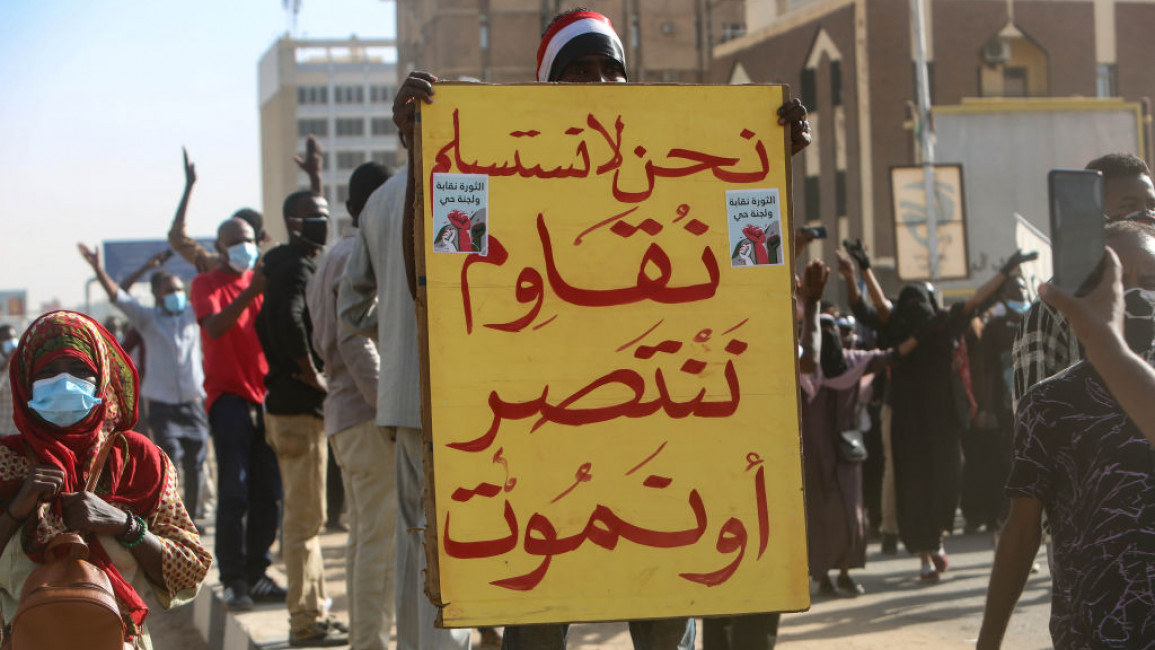
All but endorsing Sudan's coup, Biden puts US back in bed with region's autocrats
One of the most glaring aspects of the revolution and ongoing attempted counterrevolution in Sudan is the absence of the United States.
Though the relationship between the US and Sudan has had its mutual ups and downs, it is not as if the US has ever been persona non grata with the country in recent times. It was, after all, 16 years ago that the US eventually played a key role in mediating the end of the 21-year-long Second Sudanese Civil War.
There are those who would argue that the absence of US interest in Sudan is due to domestic structural and economic issues related to its wider 'withdrawal' from the Middle East and North African region.
While there are aspects of truth to this in part due to the reality of China's ascent, yet the main dynamic driving the US, guided by the dominance of foreign policy realists within the Obama, Trump and Biden administrations, is willing to leave Sudan and the wider Middle East and North African region in the hands of powerful regional allies, notably the UAE and Saudi Arabia.
"Today there is a major difference with US policy in the era of the Arab spring, as the US is siding against those fighting for freedom against tyrannies"
The US perspective had always had this realist dimension – this was particularly apparent during the Cold War, in which the realists believed, via the 'containment' strategy, that US interests and the democratic interests of the West were best served by supporting anti-communist tyrannies in the so-called "developing world".
After the Cold War, despite the heralded "triumph of liberal democracy" against "the tyranny of Marxism-Leninism", the US persisted in supporting tyrannies it considered to be friendly to US interests.
Today there is a major difference with US policy in the era of the Arab spring, as the US is siding against those fighting for freedom against tyrannies. This is the dynamic across the region, where the US has shown indifference to or has actively aided counterrevolution against democrats.
It was under the Trump administration and in the face of a democratic revolution that led to the ousting of the 30-year rule of military tyrant Omar al-Bashir, that US policy regarding Sudan was effectively outsourced to the UAE and Saudi. By supporting the UAE-Saudi axis of counterrevolution, the US is able to oppose democrats and support tyrants while maintaining some form of distance and deniability.
In Sudan, we have seen this play out with a predictably counterrevolutionary effect. Recently, braving clouds of tear gas from security forces, thousands of Sudanese took to the streets of Khartoum, Omdurman and many other cities across the country. The protests are against the October military coup in general and, more specifically, the subsequent military deal to reinstate Prime Minister Abdalla Hamdok. The pro-democracy opposition sees the deal as a way to legitimise the coup, giving the military a 'civilian' face, despite it retaining dictatorial control of the country.
The Professionals Committee and other resistance committees were the main organisers of the protests, under the slogan of 'No negotiations, no compromise, no power-sharing [with the military]'. They understand that Sudan's only hope for true liberty is for power to be put into the hands of civil democratic institutions and for the military to be reformed along those lines and stay out of politics.
The UAE's friendly proximity to the Sudanese military has been well documented. The Sudanese military has sent 40,000 troops to fight for the UAE and Saudi in Yemen, where the Saudi-UAE axis was willing to foment a catastrophic war rather than accept the democratic transition, while its paramilitary forces – the infamously murderous RSF – fought for the UAE-backed Khalifa Haftar's fascistic forces against the internationally recognized Libyan government.
There is little doubt that the petrol-rich autocratic state has been involved in pushing the Sudanese military towards curtailing if not entirely snuffing out any hopes of democracy in Sudan. The now de facto head of state of Sudan is Commander-in-Chief of the Armed Forces General Abdel Fattah al-Burhan.
Burhan has been fully supported in his take-over by fellow coupist-in-Egypt, Sisi, but the UAE has been slightly more nuanced compared to its Egyptian counterpart. Keen to maintain order in Sudan, but resolutely against demands for civil democracy, the UAE has supported Burhan's dictatorial role. However, it is widely believed that they effectively signed off on the deal to reinstate Hamdok as PM, while giving Burhan supreme powers and the ability to stack the cabinet full of loyalists.
What about the US recently? Again, it is notable only by its veritable absence. The Sudanese military launched its coup without giving any notice to the US via the usual high-level diplomatic channels. Many could interpret this as a slight against the diminishing US, yet the real question is why would the Biden administration care?
Biden might have come to power promising a new era of US support for global human rights and democracy, contrasting his apparent 'light' with the 'darkness' of Trump and his illiberal ilk, however, the reality is that Biden has been as happy as his predecessor to let the UAE and Saudi have their run of the region.
"In the end, the US, under the logic of foreign policy realism, views democracy in the Middle East and North African region as a threat to stability and its interests"
Apologists might point to the US suspending US$ 700 million of aid to Sudan after the coup, but this is precisely why the UAE pushed for the Sudanese military to co-opt Hamdok into their plan. It is also widely understood that the US will release the aid as long as Hamdok is reinstated under the current regime – the military regime will get access to US aid through Hamdok. As Samahir Mubarak, a member of the Sudanese Professionals Association, put it, "The US is reducing the entire transition to supporting a single person, and that's giving a way out to the military."
In the end, the US, under the logic of foreign policy realism, views democracy in the Middle East and North African region as a threat to stability and its interests.
Accordingly, it sees the UAE-shaped order – one where Sudan is ripe for full economic exploitation by anti-democratic kleptocrats with no regard for human rights, or where military generals, and the Israel-friendly Burhan in particular, happily signs up for the UAE’s normalisation with Israel – as the preferable goal.
Sam Hamad is a writer and History PhD candidate at the University of Glasgow focusing on totalitarian ideologies.
Join the conversation @The_NewArab.
Have questions or comments? Email us at: editorial-english@alaraby.co.uk.
Opinions expressed in this article remain those of the author and do not necessarily represent those of The New Arab, its editorial board or staff.



